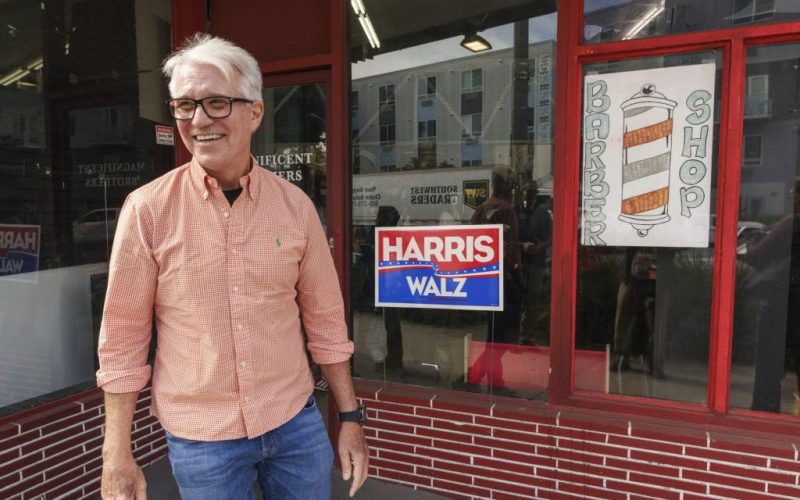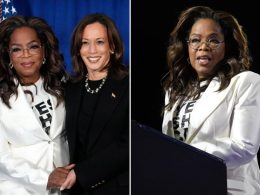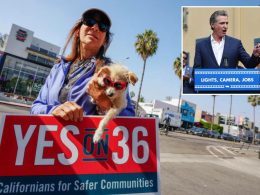Vice President Kamala Harris frequently touted her prosecutorial bona fides on the campaign trail, probably sensing political peril in boosting her prior support for soft-on-crime policies.
Yet she refused to say how she voted on California’s Proposition 36 to restore tough penalties for drugs and theft, despite its overwhelming backing in public surveys. (The measure sailed through with 70% support — the highest margin for any contested referendum in recent California history.)
Harris hedged because she was stuck between a rock (public opinion) and a hard place (her political benefactors including leftist billionaire George Soros).
The results in prosecutor races across the country — particularly in Harris’ home state and across the battleground states — demonstrate even Democratic voters are done with the soft-on-crime experiment.
The progressive “reform” candidate lost in 13 of last week’s top 25 district-attorney races — even in liberal bastions.
In California, justice reformers were trounced by double digits in three pivotal races even as Harris herself posted huge margins.
San Francisco DA Brooke Jenkins, the tough-on-crime replacement for recalled Chesa Boudin, beat Boudin’s handpicked candidate two-to-one despite Harris winning the city by a 65-point margin.
Across the bay in Alameda County, home to Oakland and Berkeley, voters recalled the Soros-financed DA Pamela Price by a nearly two-to-one margin while Harris clinched the county 74% to 26%.
Harris won Los Angeles County by 30 points yet DA George Gascón lost by 23 points — meaning more of her voters backed his tough-on-crime opponent, Nathan Hochman.
Notably, more than half of Harris voters backed Prop 36, which repealed laws Gascón bragged he authored.
Tough-on-crime candidates, despite being outspent by outside advocacy groups often financed by lefty moneymen like Soros, won more often than not across the 25 most-contested elections.
And the voter backlash against soft-on-crime policies was especially acute in the battleground states.
In Georgia, Deborah Gonzalez, the DA where a recently arrested but released illegal alien allegedly killed nursing student Laken Riley, lost by 20 points — running 16 points behind Harris, who carried those counties with 56.5% to President-elect Donald Trump’s 43.5%.
While Savannah’s progressive prosecutor Shalena Cook Jones held on to her seat, she ran behind the Democratic ticket by 5.5 points.
Traditional prosecutors in Arizona’s Maricopa County and Michigan’s Macomb County overperformed Trump’s margins and beat back leftist challengers.
Across deep-blue counties in both red and blue states, the tough-on-crime prosecutors consistently received a greater share of the vote than Trump, suggesting their message resonated with a broad electorate.
Conversely, progressive candidates received an 8-point-smaller share of the two-way vote than Harris did at the top of the ballot.
In other words, Harris voters — both liberals in California and independents in the swing states — chose the traditional approach to prosecution. That does not even account for the voters who were chose Trump as a rejection of the wave of progressive prosecutors in big cities and their unpopular policies.
A decade ago, the average voter would have been stumped if asked to name a district attorney 1,000 miles away, but today, Soros prosecutors like Larry Krasner, Alvin Bragg, Kim Foxx and others are household names after drawing national attention — but not in a good way.
Case in point: last year’s DA race in Pittsburgh’s Allegheny County, where Soros helped bankroll a progressive candidate with hundreds of thousands of dollars who still lost in the heavily Democratic district.
The winner’s campaign could be summed up with “Don’t Philadelphia My Pittsburgh!”
Elsewhere, Soros DAs are becoming an endangered species — hunted to extinction in Democratic primaries.
Over the past two years, traditionally minded candidates beat progressive incumbents in primaries in a half-dozen liberal bastions including Baltimore and Portland.
Democrats in Chicago replaced Kim Foxx, who, sensing the political headwinds, chose not to run again, with a tough-on-crime prosecutor.
Of the roughly 75 Soros-linked prosecutors nationwide we identified in 2022, more than 30 have left office and 20 have been replaced by traditional DAs in places ranging from suburban Loudoun County, Va., to Tampa, Fla., and from rural Mississippi to Boston.
Courts or legislatures might well remove others in Texas, Tennessee, Mississippi and Georgia from office in the coming year due to ongoing scandals.
While a few jurisdictions like Harris County, Texas, did elect new progressive prosecutors with the ample help of Soros’ millions, the writing is on the wall in most of America’s big cities: No Soros DAs Need Apply.
Americans — yes, including a lot of Democrats — are tired of Soros-linked prosecutors who refuse to do their jobs.
Jason Johnson is the president of the Law Enforcement Legal Defense Fund. Sean Kennedy is its policy director. Its 2022 report “Justice For Sale” was the first to comprehensively track Soros prosecutors and their financing.








